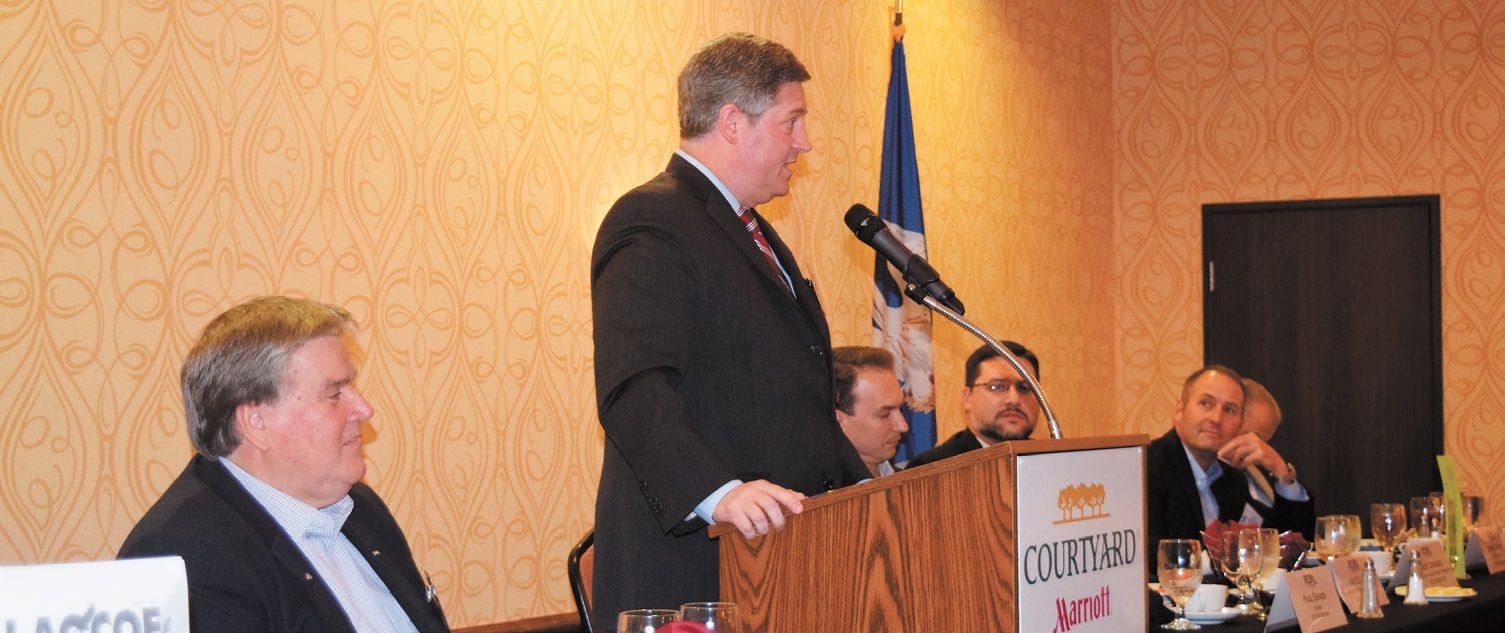Lafourche Chamber to host awards banquet
November 4, 2015
Rita teen and hero reunited
November 4, 2015BP’s head of state and local affairs Joe Ellis talked about the Bayou Region’s long history of supporting the oil and gas industry during a recent South Central Industrial Association luncheon.
However, Ellis also delivered a strong message regarding threats to the future of the state’s economy. He said rather than the decline of oil prices, Louisiana should be most concerned with its own penchant for lawsuits.
“The oil and gas industry in Louisiana, and I respectfully submit broader business interests in Louisiana, are threatened not as much by declining oil prices and market fluctuations as they are by an attitude that some have, certainly not everyone, that the industry’s deep pockets make for good lawsuits,” he said.
Ellis’s statements come after BP’s historic payments related to the Deepwater Horizon explosion and subsequent oil spill. As of September, the British oil giant has paid out $5.6 billion in claims to people and businesses harmed by the spill. On Oct. 5, the U.S. Justice Department revealed the final details of its civil settlement with BP, which will cost the company $20.8 billion.
However, Ellis did not specifically address Deepwater-related costs. He instead focused on a survey released in September by the U.S. Chamber of Commerce’s Institute for Legal Reform. The national survey asked 1,203 corporate attorneys to rate states based on their lawsuit climates for businesses, and Louisiana was ranked at 49th out of 50 overall – only ahead of West Virginia.
This is the 10th edition of the survey, which the institute has conducted since 2002. The highest overall ranking Louisiana has achieved is 47th, which happened four times from
2002-05.
In certain categories of the survey, the Pelican State ranked dead last. The lawyers questioned were particularly hard on judges in Louisiana, ranking them last in the country based on impartiality, competence and fairness. The state rated last in its timeliness of summary judgment or dismissal, a category in which it also brought up the rear in the previous 2012 edition.
Louisiana’s highest mark was in the discovery process of trials, where attorneys pegged it at 47th out of 50. During his time at the podium, Ellis talked about how lawsuits running rampant can steer opportunity in a dangerous direction.
“If any state allows an environment that values litigation over economic investment
then the result will be economic prosperity for a handful of people and diminished economic foundations for hundreds of thousands of others,” he said.
Ellis also mentioned that efforts to reform litigation have already begun in Louisiana.
He said that a continued push could convince hesitant businesses to commit to the state, which would in turn lead to a healthier economy.
“A productive business climate can open any state for more investment by the oil and gas industry and other businesses. It will add jobs; create new tax revenue for schools, roads and healthcare,” Ellis said. “And it is fostered by a legal system that is fair to all citizens and businesses.”
Ellis’s statement is backed by another report published by the Institute for Legal Reform, conducted by Paul Hinton and David McKnight of NERA Economic Consulting in 2011. This report measured the tort costs for each state, how much these costs were affected by the state’s legal environment and the potential for those costs to be reduced by changing
the legal environment. The paper used the cost reduction figures to estimate how much employment in each state would increase.
The authors of the study talked about how costly lawsuits are for small businesses in the country, particularly those that do not have legal insurance to pay out claims.
“In 2008, the tort liability price tag for small businesses in the U.S. with less than $10 million in revenue was $105.4 billion. This includes both dollars paid pursuing and defending lawsuits as well as dollars paid to plaintiffs,” the authors wrote. “Small businesses bore 81 percent of business tort liability costs but took in only 22 percent of revenue. A large portion of these costs ($35.6 billion) was paid out of pocket as opposed to through insurance.”
In the study, the authors pegged Louisiana’s $3.912 billion in 2009 legal costs.
Those costs covered commercial, medical malpractice and personal tort costs, with commercial lawsuits making up a majority of the costs for the state. That number was not one of the highest in the country, as these figures do not control for state population or economy size.
However, Louisiana did rank first overall in the amount that its legal environment affected the state’s total. Hinton and McKnight estimated that 26 percent of the state’s legal costs were a factor of the environment.
These numbers do provide the opportunity for growth, though. The authors speculated
that the state could cut tort costs by $1.018 billion by improving the legal environment to that of Delaware, which is perceived to have the best legal environment.
Hinton and McKnight estimated the savings could bump Louisiana’s employment anywhere from 1.03 to 2.79 percent.
Ellis mentioned the Terrebonne Parish president at the luncheon, hoping future leaders in the state would emulate his relationship with the oil and gas industry.
“We, Louisiana, and elsewhere, we need more Michel Claudets. He told trial lawyers in Terrebonne Parish not to sue the industry that created tens of thousands of jobs and provided a sustained tax base for years,” Ellis said.
Ellis did not offer any particular policy suggestions during his speech. Rather, he focused on broad ideas like fairness, transparency and reason within the legal system. He did say that while the price of oil is not under the state’s control, Louisiana does have the chance to change things such as its attitude in the courtroom.
“What we can do today might not have any impact on the price of oil. But what we can do today here and elsewhere in this country can have a tremendous impact on what opportunities come our way when the market calibrates itself,” Ellis said. •













